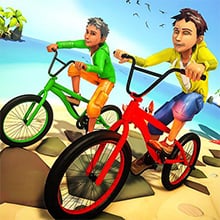
Bicycle Games
Discover 13 amazing bicycle games. Play for free and have fun!
About Bicycle Games
What are Bicycle Games?
Bicycle games are virtual cycling games that can be played online or on mobile/tablet devices. They include a variety of game genres focused on riding bikes both for leisure and competition.
Some common types of Bicycle Games include:
Cycling simulations that realistically replicate the experience of riding a bike through different environments like roads and trails. Players control aspects like steering, braking and shifting gears.
Cycling racing games where the goal is to compete against other players or AI in bike competitions and events. Strategy, stamina management and timing sprints are important.
Cycling adventure games with an open world for exploration on bikes. Players complete challenges, collect items and upgrade gear while riding through varied terrains.
Casual/party cycling games with lighter gameplay focused more on fun than realism. These may include mini-games or zany multiplayer modes involving bikes.
Bicycle Games cover a range of digital titles centered around riding bikes for both leisure and competitive purposes through different game genres.
Brief Overview Of The Origin Of Bicycle Games
One of the earliest Bicycle Games was Bicycle Race, released in 1976 for the Magnavox Odyssey2 console. It was a primitive two-player game where players raced side-by-side on stationary bicycle controllers.
In the 1980s, cycling games started appearing more frequently as the genre evolved. Notable early titles included 1982's BMX-Big Bike for the Atari 2600, featuring bikes riding over hills and ramps.
As consoles became more advanced in the 1990s, racing simulations emerged. Excitebike for the Nintendo Entertainment System in 1984 was an influential early motocross game with playable cyclists.
Mountain biking grew in popularity, fueling a series of mountain biking games in the 1990s like Mountain Bike Rally for the Sega Genesis in 1991.
The 1998 videogame Top Gear: Overdrive on PlayStation popularized full simulation of cycling handling and pedaling strategies.
What Are Required Skills To Play Bicycle Games?
Playing Bicycle Games requires a combination of skills depending on the type of game you're playing. Here are some essential skills that can be beneficial for most Bicycle Games:
Strategy: Developing strategic thinking is crucial for games like poker, bridge, or other card games where you need to anticipate your opponents' moves and make optimal decisions.
Memory: Good memory skills can be helpful for remembering which cards have been played, tracking patterns, and planning your next moves accordingly.
Overcoming Challenges Skills: Many Bicycle Games feature puzzles or challenges that require problem-solving skills to overcome. Analyzing the game state and finding the best solutions are key to success in these games.
Observation: Being observant and paying attention to details is important for noticing patterns, identifying opportunities, and avoiding mistakes in card games and puzzles.
Patience: Some Bicycle Games require patience and perseverance to achieve your goals, especially when facing difficult levels or challenging situations.
Quick Thinking: In games with time limits or fast-paced gameplay, being able to think quickly and make decisions under pressure can give you an advantage.
Adaptability: Flexibility and adaptability are essential for adjusting your strategies and tactics based on changing game conditions, opponent actions, or unexpected events.
Understanding of Game Mechanics: Familiarity with the rules and mechanics of the specific game you're playing is essential for making informed decisions and maximizing your chances of success.













